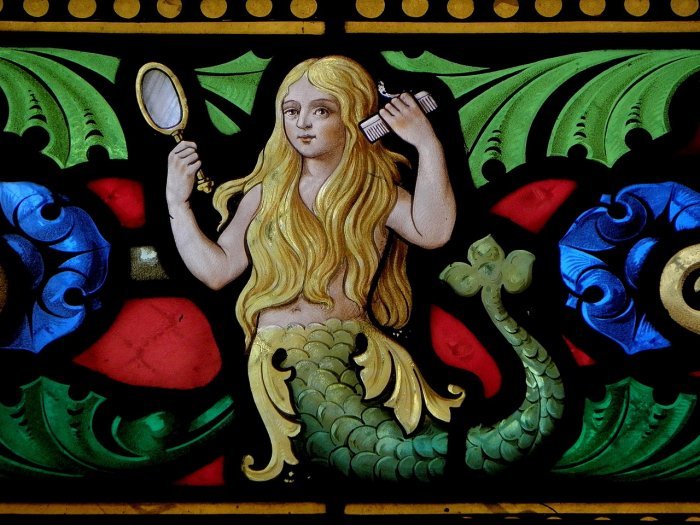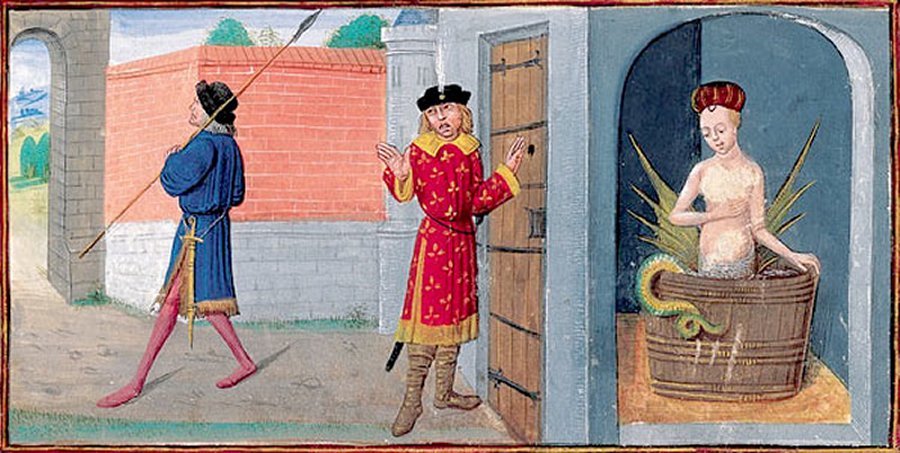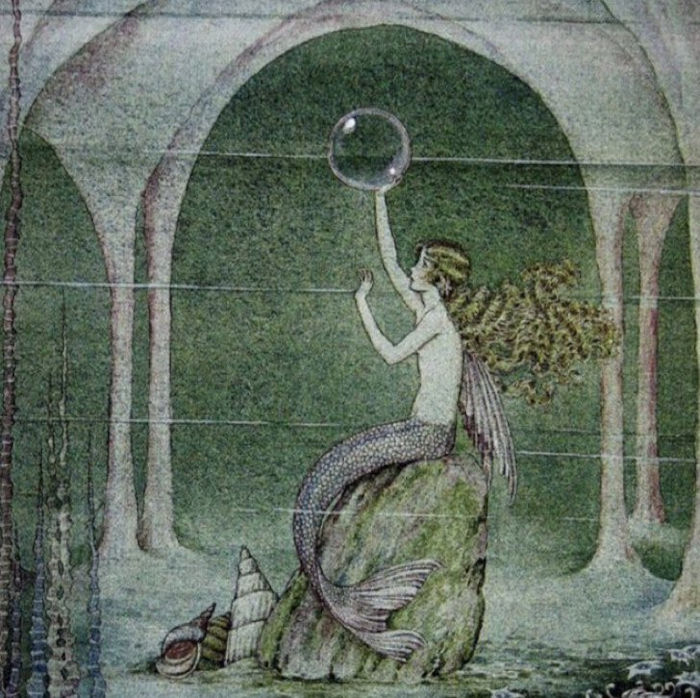Melusine: Charming Water Fairy In European Legend About Taboo And Broken Promise
A. Sutherland - AncientPages.com - Many intriguing legends surround Melusine (Melusina), a daughter of Pressina. Melusine was a charming water fairy and a fictional figure in a well-known European legend.
This figure of European folklore and mythology (probably a tradition of ancient Gaul) is mentioned in countless fascinating stories of people who lived across France, Luxembourg, Germany, Bohemia, and parts of the Iberian Peninsula, the Balkans, and Asia Minor around the millennium before Christ onwards.
The fairy Mélusine: the image of the fairy with the long hair, its mirror in the hand, decorates one of Saint-Sulpice church's stained-glass windows. Image credit: Pays de Fougères.
In old times, lakes were believed to be entrances to the otherworld throughout the Celtic lands. In magnificent palaces located in those lakes lived fairy women who were occasionally seen from shore. In Celtic beliefs they made perfect wives for human men but only under certain conditions.
Melusine's Mother Pressina That Demanded A Promise
An ancient French story tells that Pressina, a beautiful water fairy, married a human man, but this union was not unconditional. It was based on a promise the wife demands—in this case, that the husband should never see her while she was delivering a child or bathed.
Unfortunately, Pressina's human husband was unable to keep such a promise. He was excited and happy when he heard that his wife had delivered triplets, and he entered her birth chamber. Surprised, he saw a very angry woman who immediately reminded him of his broken promise, then disappeared with the children.
Melusine – Beautiful But Elusive Fresh -Water Mermaid
Melusine strongly inspired folk tales and medieval literature, and her own story has many different versions. Still, most of them confirm that Melusine was the oldest of Pressina's three daughters (two others were Meliot and Palatina).
Melusine is usually depicted as a beautiful young creature with the head and upper body of a woman and the tail of a fish but sometimes also with wings. She is an elusive and potentially dangerous spirit dwelling in and around streams and freshwater springs.
Raymond walks in on his wife, Melusine, in her bath and discovers she has the lower body of a serpent. Illustration from the Jean d'Arras work, Le livre de Mélusine (The Book of Melusine), 1478. Image via wikipedia
She grew up angry at her father for breaking his promise and denying them the luxuries of human life. When Melusine was old enough to take revenge on her father, she arranged a raid on her father's castle, detaining him and all the people around him inside a magical mountain. However, her mother did not like the daughter's revengeful action and cursed her to become a serpent from the waist down every Saturday.
The spell would be broken when Melusine met a man who would marry her and promise never to see her on Saturdays, and so it happened one day.
Melusine And Raymond Love Story
One day, Melusine wandered to the forest of Colombiers in Poitou, one of France's historical provinces, which in the Middle Ages was part of Aquitaine that passed to France in 1137 when the famous and powerful duchess Eleanor of Aquitaine married Louis VII of France.
In the forest, Melusine met a young nobleman named Raymond; they fell in love and married. Like her mother, Melusine put certain limitations on her human husband who had to promise that he would never enter her rooms on Saturday (Sunday) because this particular day she must spend in complete seclusion.
They lived happily for many years together, but one day, something unpleasant happened, and this incident had severe consequences for Melusine and Raymond.
A mermaid in her kingdom under the sea, by Ida Rentoul Outhwaite, 1930. Credit: Public Domain
Like many other human men married to fairy women, Raymond was also unable to keep the promise given to his wife. One Sunday, he really could not resist temptation and spied on his wife. His discovery was shocking: Melusine was a part-woman, part-serpent. It was a secret that Raymond could not keep to himself. Soon after that, during a disagreement, he publicly called her a "serpent" in front of his court. From that moment, their marriage was over. Melusine was not angry but very sad; she altered her appearance to a winged dragon and disappeared, never to be seen again.
One legend says that the grief-stricken Raymond became a hermit until he died. According to another version of this sad story, Melusine was so furious at Raymond's betrayal that she momentarily disappeared and after that haunted his family as a kind of Banshee.
Melusine became closely related to significant historical events taking place in contemporary Europe. As her popularity grew, she appeared in countless folk tales and medieval literature that continuously shaped people's imagination and fantasy.
Melusine gave inspiration to stories.
Interpretations of Melusine's personality and nature varied. Some turned her into an evil beast-like in "The Cathedral," an 1898 novel by Joris-Karl Huysmans, while others maintained she was a beautiful young mermaid. Melusine was undoubtedly an intriguing figure that occupied the minds of famous people such as for example, Martin Luther, Johannes W. Goethe, and Lamotte Fouque in his story "Undine" devoted to a young knight who swore eternal loyalty to the water sprite, Undine, but finally, broke his promise and was killed by her.
Updated on May 27, 2024
Written by – A. Sutherland - AncientPages.com Senior Staff Writer
Copyright © AncientPages.com All rights reserved. This material may not be published, broadcast, rewritten or redistributed in whole or part without the express written permission of AncientPages.com
Expand for referencesMore From Ancient Pages
-
 North America’s New Snake Species Deepen Our Understanding Of Reptile Social Behavior And Development
Evolution | Aug 2, 2024
North America’s New Snake Species Deepen Our Understanding Of Reptile Social Behavior And Development
Evolution | Aug 2, 2024 -
 First Animals On Earth Could Have Evolved Much Earlier Than The Oldest Fossils Suggest
Fossils | Oct 13, 2022
First Animals On Earth Could Have Evolved Much Earlier Than The Oldest Fossils Suggest
Fossils | Oct 13, 2022 -
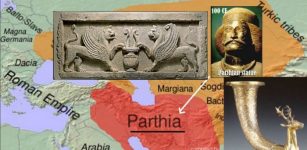 Next Discovery In Tepe Ashraf, Isfahan – Archaeologists May Have Stumbled Upon Ancient Necropolis
Archaeology | Aug 16, 2020
Next Discovery In Tepe Ashraf, Isfahan – Archaeologists May Have Stumbled Upon Ancient Necropolis
Archaeology | Aug 16, 2020 -
 Another Franklin Expedition Crew Member Identified
Archaeology | Sep 26, 2024
Another Franklin Expedition Crew Member Identified
Archaeology | Sep 26, 2024 -
 Starkad The Viking – Legendary Norse Hero Who Was Both Blessed And Cursed By Gods
Featured Stories | Jul 29, 2019
Starkad The Viking – Legendary Norse Hero Who Was Both Blessed And Cursed By Gods
Featured Stories | Jul 29, 2019 -
 Achaemenid Empire Was The World’s Largest Ancient Empire
Ancient History Facts | Mar 26, 2016
Achaemenid Empire Was The World’s Largest Ancient Empire
Ancient History Facts | Mar 26, 2016 -
 Young Boy Discovers Rare Ancient Roman Treasure In Sussex, UK
Archaeology | Apr 15, 2024
Young Boy Discovers Rare Ancient Roman Treasure In Sussex, UK
Archaeology | Apr 15, 2024 -
 Location Of Burial Place Belonging To Alexander Nevsky’s Son And Grandson – Found
Archaeology | May 3, 2021
Location Of Burial Place Belonging To Alexander Nevsky’s Son And Grandson – Found
Archaeology | May 3, 2021 -
 Sodré Astrolabe, Found On Portuguese Armada Shipwreck Is The Oldest In The World
Archaeology | Mar 19, 2019
Sodré Astrolabe, Found On Portuguese Armada Shipwreck Is The Oldest In The World
Archaeology | Mar 19, 2019 -
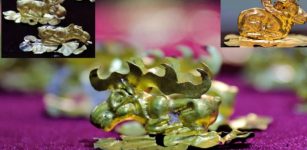 Gold Dated To Scythian-Saka Era Unearthed In Valley Of The Kings In East Kazakhstan
Archaeology | Sep 14, 2020
Gold Dated To Scythian-Saka Era Unearthed In Valley Of The Kings In East Kazakhstan
Archaeology | Sep 14, 2020 -
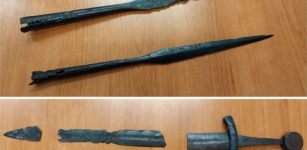 Swords And Spears Of The Yotvingians – A Long-Forgotten Ancient Warrior Culture Discovered In Poland
Archaeology | Jan 6, 2020
Swords And Spears Of The Yotvingians – A Long-Forgotten Ancient Warrior Culture Discovered In Poland
Archaeology | Jan 6, 2020 -
 Samurai – Powerful Skilled Warriors Who Loved Music, Art And Poetry
Featured Stories | Dec 9, 2017
Samurai – Powerful Skilled Warriors Who Loved Music, Art And Poetry
Featured Stories | Dec 9, 2017 -
 Archaeologists unearthed artifacts in a 3,700 year-old mine factory
Artifacts | Aug 22, 2015
Archaeologists unearthed artifacts in a 3,700 year-old mine factory
Artifacts | Aug 22, 2015 -
 On This Day In History: Battle Of Ayacucho Was Fought In Peru – On Dec 9, 1824
On This Day In History | Dec 9, 2016
On This Day In History: Battle Of Ayacucho Was Fought In Peru – On Dec 9, 1824
On This Day In History | Dec 9, 2016 -
 Mysterious Kofun – Ancient Japanese Tombs Were Aligned Towards The Rising Sun And Goddess Amaterasu – Satellite Images Reveal
Archaeology | Jan 20, 2022
Mysterious Kofun – Ancient Japanese Tombs Were Aligned Towards The Rising Sun And Goddess Amaterasu – Satellite Images Reveal
Archaeology | Jan 20, 2022 -
 Ancient City Of Aizanoi: Statue Heads Of Greek Gods Unearthed In Excavations
Archaeology | Nov 23, 2021
Ancient City Of Aizanoi: Statue Heads Of Greek Gods Unearthed In Excavations
Archaeology | Nov 23, 2021 -
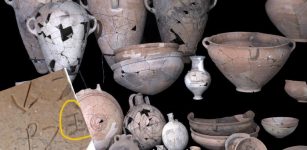 Canaanite Temple Dated To 12th Century BC Unearthed At Lachish, Israel
Archaeology | Feb 19, 2020
Canaanite Temple Dated To 12th Century BC Unearthed At Lachish, Israel
Archaeology | Feb 19, 2020 -
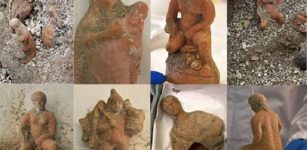 13 Ancient Terracotta Figurines Associated With Cybele And Attis Unearthed In Pompeii
Archaeology | Dec 28, 2023
13 Ancient Terracotta Figurines Associated With Cybele And Attis Unearthed In Pompeii
Archaeology | Dec 28, 2023 -
 The Apaches’ Mysterious Encounter With Unknown Beings
Featured Stories | Jun 10, 2024
The Apaches’ Mysterious Encounter With Unknown Beings
Featured Stories | Jun 10, 2024 -
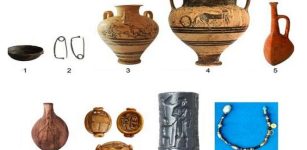 Cyprus’s Copper Deposits Created One Of The Most Important Trade Hubs Of The Bronze Age
Archaeology | Mar 17, 2023
Cyprus’s Copper Deposits Created One Of The Most Important Trade Hubs Of The Bronze Age
Archaeology | Mar 17, 2023

